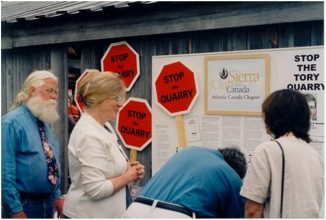Eco-groups join in $ 101M Bilcon quarry fight

The Chronicle Herald | 5 June 2016
Eco-groups join in $101M Bilcon quarry fight
There’s a new wrinkle in Nova Scotia’s 2007 rejection of a proposed 120-hectare coastal quarry and marine terminal at Digby Neck.
The environmental lobby is going to bat for the federal and provincial governments against international big business in a $101-million argument.
Bilcon, a Delaware quarry company behind the kiboshed project, is now seeking $101 million in damages after a 2-to-1 NAFTA tribunal decision against Canada and Nova Scotia in the nine-year-old case.
The Federal Court of Canada, which decides claims against the Canadian government, has granted the Sierra Club of Canada Foundation and East Coast Environmental Law (ECELAW) intervener status.
The 2007 provincial and federal decision to reject the quarry-terrminal project came on the heels of an environmental impact assessment and the recommendations of Joint Review Panel of three professors from Dalhousie University.
Nova Scotia and the federal government rejected the Whites Point project in late 2007, with the Government of Canada citing the former Canadian Environmental Assessment Act that the project was likely to cause significant and adverse environmental effects that were not justified, but Bilcon alleged to the tribunal that the federal and provincial environmental assessment required prior to construction and operation was “arbitrary, discriminatory and unfair.”
Unsatisfied with the decision, the quarry company, Bilcon of Delaware, filed a claim under the North American Free Trade Agreement (NAFTA).
In its March 17, 2015 Award on Jurisdiction and Liability, the tribunal found Canada liable for having breached its NAFTA obligations.
The tribunal’s majority findings were based on the fact that the JRP’s recommendation relied on the application of a standard, “core community values,” that was not found in Canadian law. Citing a provision requires Canada to accord NAFTA investors treatment no less favourable than that which it accords, in like circumstances, to domestic investors, they concluded there was a lack of due process because the proponents were not given an opportunity to make a case based on this criterion. (Professor Donald McRae issued a dissenting opinion.)
In June 2015, Canada filed a notice of application with the Federal Court of Canada seeking to set aside the award on the grounds that the tribunal exceeded its jurisdiction and that the award is in conflict with the public policy of Canada.
The Whites Point project’s opponents say it’s a key environmental case with international consequences.
Members of ECELAW and the Sierra Club participated in the Joint Review Panel for the proposed quarry, testifying on ecological and socio-economic impacts of the coastal quarry.
“We applaud the Government of Canada for seeking to have the NAFTA Tribunal decision set aside and as interveners we will make every effort to ensure that the Federal Court has the information they need to make a decision,” said Lisa Mitchell, staff lawyer with ECELAW.
Gretchen Fitzgerald, Director of the Atlantic Canada Chapter of Sierra Club Canada Foundation said upholding the NAFTA tribunal’s decision would be disastrous for future environmental assessments involving U.S. companies.
“The threat of future appeals to investor-state provisions in free trade deals will cast a chill over local communities, because no matter how much damage a project might do, their concerns can be essentially overruled – at great cost,” she said.
Ecojustice lawyers will be working on behalf of the intervenors in the case.





